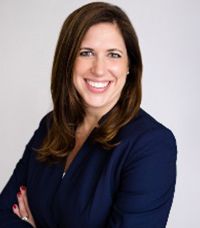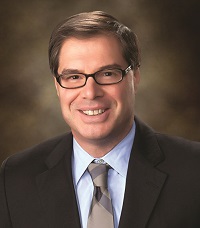ASGE Advanced Practice Provider Case of the Month
Sarah Enslin, PA-C, Lead APP,
Gastroenterology and Hepatology
University of Rochester Medical Center
Rochester, New York
and
Joseph Vicari, MD, MBA, FASGE
Rockford Gastroenterology Associates
Rockford, Illinois

Sarah Enslin, PA-C

Joseph Vicari, MD, FASGE
Case 2
A 45-year-old African American female presents to her gastroenterologist for an open access screening colonoscopy. Currently, she is asymptomatic. She has no known family history of colon cancer or colon polyps. This is her first colonoscopy. Past medical history includes hypertension, well-controlled on chlorthalidone. She exercises 4-5 times per week and adheres to a low-fat diet. She drinks 2-4 glasses of wine per week. She does not smoke or use recreational drugs.
A screening colonoscopy was performed, and a 6 mm sessile polyp was removed with a cold snare. Histology revealed a tubular adenoma.
When should she return for her surveillance colonoscopy?
A. 6 months
B. 1 year
C. 3-5 years
D. 7-10
The correct answer is D. The patient has a low-risk adenoma and should undergo surveillance colonoscopy in 7-10 years.
Practice Pearls
Screening for colon cancer in average-risk patients begins at age 45 and continues through age 75.
Screening for colon cancer in average-risk patients should be individualized for those aged 76-85 based on shared decision-making between patients and their doctors.
Screening tests for colon cancer include colonoscopy, fecal immunochemical test (FIT) and multitarget stool DNA test with fecal immunochemical testing (MT-sDNA).
- The US Multi-Society Task Force for Colorectal Cancer ranks colonoscopy and FIT tests as Tier 1.MTs-DNA is a Tier 2 test.
Colonoscopy is the gold standard test for colorectal cancer screening based on its sensitivity for polyp detection and ability to resect polyps in the same session. 60%-90% of colon cancers can be prevented with colonoscopy and polypectomy.
If colonoscopy is unsuccessful due to difficult anatomy (ex: severe distortion from diverticular disease, abdominal adhesions), CT colonography should be considered for screening.
The following intervals should be followed for screening modalities in average risk patients with normal findings:
- Colonoscopy every 10 years
- FIT every 1 year
- MT-sDNA every 3 years
- CT colonography every 5 years
Surveillance intervals after polypectomy are based on number, size and histology of the lesions. The following surveillance intervals are recommended:
- Adenomas
- Low-risk tubular adenoma < 10mm: 7-10 years
- 3-4 tubular adenomas < 10mm: 3-5 years
- High-risk adenoma(s): > 10mm in size, 5-10 adenomas < 10mm, tubulovillous/villous histology, high-grade dysplasia: 3 years
- > 10 adenomas: 1 year, consider genetic syndromes
- Hyperplastic polyps
- < 20 hyperplastic polyps all <10mm in the left colon: 10 years
- Hyperplastic polyp > 10mm: 3-5 years
- Hyperplastic polyps in the right colon: follow same surveillance intervals as adenomas
- SSP
- 1-2 SSPs < 10 mm: 5-10 years
- SSP > 10mm, 3-4 SSPs < 10mm: 3 years
References
UpToDate Overview of colon polyps and Screening for colorectal cancer: Strategies in patients at average risk. Retrieved from the UptoDate.com website, https://www.uptodate.com
Screening for Colorectal Cancer: US Preventative Services Task Force Recommendation Statement. JAMA. 2021;325(19):1965-1977
Shaukat A, Kahi C, Burke C et al. ACG Clinical Guidelines: Colorectal Cancer Screening 2021. The American Journal of Gastroenterology. 2021;116(30):458-479
Gupta S, Lieberman D, Anderson J, et al. Recommendations for Follow-up After Colonoscopy and Polypectomy: A Consensus Update by the US Multi-Society Task Force on Colorectal Cancer. Gastrointestinal Endoscopy. 2020;91(3):463-485
Sarah Enslin, RPA, is a physician assistant at the University of Rochester Medical Center in Rochester, NY. Sarah serves on several national GI committees and is a member of the ASGE Practice Operations Committee. Joseph Vicari, MD, FASGE, joined Rockford Gastroenterology in 1997 and has served as managing partner. He previously served as chair of the ASGE Practice Operations Committee and currently serves as councilor on the ASGE Governing Board.